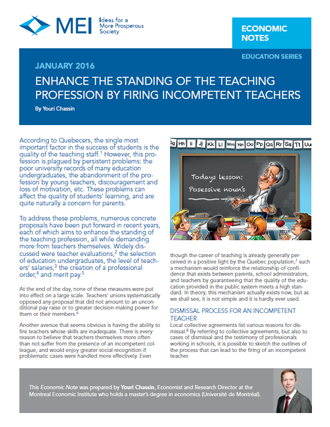Enhance the Standing of the Teaching Profession by Firing Incompetent Teachers

According to Quebecers, the single most important factor in the success of students is the quality of the teaching staff. However, this profession is plagued by persistent problems: the poor university records of many education undergraduates, the abandonment of the profession by young teachers, discouragement and loss of motivation, etc. These problems can affect the quality of students’ learning, and are quite naturally a concern for parents.
Media release: Quebec students’ futures mortgaged by incompetent teachers
 Links of interest
Links of interest
 |
 |
 |
|
Lettre d'amour aux enseignants québécois (The MEI's Journal de Montréal blog, January 21, 2016)
Les questions d'une syndicaliste sur le congédiement des enseignants (The MEI's Journal de Montréal blog, January 29, 2016) It's way too hard to weed out bad teachers (Montreal Gazette, February 8, 2016) |
Interview (in French) with Youri Chassin (Dutrizac, 98.5FM, January 18, 2016)
Interview (in French) with Youri Chassin (Normandeau-Duhaime, FM93, January 18, 2016) Interview (in French) with Youri Chassin (Solide comme le Roch, 104.7FM, January 18, 2016) Interview (in French) with Youri Chassin (Midi actualité, 107.7FM, January 18, 2016) |
Report with Youri Chassin (Global News, January 19, 2016)
Interview with Youri Chassin (News at Noon Montreal, January 26 2016) |
Enhance the Standing of the Teaching Profession by Firing Incompetent Teachers
According to Quebecers, the single most important factor in the success of students is the quality of the teaching staff.(1) However, this profession is plagued by persistent problems: the poor academic records of many education undergraduates, the abandonment of the profession by young teachers, discouragement and loss of motivation, etc. These problems can affect the quality of students’ learning, and are quite naturally a concern for parents.
To address these problems, numerous concrete proposals have been put forward in recent years, each of which aims to enhance the standing of the teaching profession, all while demanding more from teachers themselves. Widely discussed were teacher evaluations,(2) the selection of education undergraduates, the level of teachers’ salaries,(3) the creation of a professional order,(4) and merit pay.(5)
At the end of the day, none of these measures were put into effect on a large scale. Teachers’ unions systematically opposed any proposal that did not amount to an unconditional pay raise or to greater decision-making power for them or their members.(6)
Another avenue that seems obvious is having the ability to fire teachers whose skills are inadequate. There is every reason to believe that teachers themselves more often than not suffer from the presence of an incompetent colleague, and would enjoy greater social recognition if problematic cases were handled more effectively. Even though the career of teaching is already generally perceived in a positive light by the Quebec population,(7) such a mechanism would reinforce the relationship of confidence that exists between parents, school administrators, and teachers by guaranteeing that the quality of the education provided in the public system meets a high standard. In theory, this mechanism actually exists now, but as we shall see, it is not simple and it is hardly ever used.
Dismissal Process for an Incompetent Teacher
Local collective agreements list various reasons for dismissal.(8) By referring to collective agreements, but also to cases of dismissal and the testimony of professionals working in the school system, it is possible to sketch the outlines of the process that can lead to the firing of an incompetent teacher.
The Evaluation of a Teacher Before Tenure Is Obtained
Before obtaining tenure, also known as permanence, a teacher will be evaluated on at least two occasions by school administrators. The Commission scolaire de Montréal (CSDM), the largest school board in the province of Quebec, uses an evaluation grid with 43 indicators covering among other things teaching skills, contribution to school life, and level of mastery of the French language.(9)
On the basis of this evaluation, the teacher qualifies either for supply teaching, for a part-time position, or for a full-time position leading to tenure.(10) If administrators do not have time to evaluate a teacher because they are overwhelmed, as sometimes happens, or if they fail to produce the evaluation, this omission is considered to be equivalent to a positive evaluation.(11)
In numerous school boards, particularly francophone ones, as soon as a teacher obtains tenure, teaching quality is no longer evaluated. Indeed, practices vary from one school board to the next. As for anglophone school boards, they appear to carry out periodic evaluations.(12)
Complaints
In the absence of regular evaluations of teaching quality, it is essentially complaints that can raise a flag for school administrators. These complaints can come from students or from parents. Sometimes, it is colleagues who complain that the students who come to them do not have an adequate command of the material that was supposed to have been taught by the teacher of a prior course.
Before reaching the stage of a formal dismissal, numerous steps must be followed in order to prove the incompetence of a teacher beyond any doubt. School administrators start by meeting with the teacher individually to inquire how he or she is doing and find out if he or she is experiencing any particular difficulties. At this point, administrators must offer the teacher help, training, in-class observation if it is desired, advice, or the support of an educational consultant or of fellow teachers. However, given that the teacher has tenure, no evaluation of competence is possible at this stage, which aims simply to support the teacher.
Pedagogical Supervision
If administrators receive further complaints, they can resort to pedagogical supervision, which involves regular follow-up over a long period, lasting several months or even more than an entire school year. During this period, a teacher must achieve a certain number of precise objectives. Training will be offered, administrators may drop in on classes (with advance warning), and regular meetings will be held. Teachers demonstrating a willingness to improve will have all the necessary tools at their disposal to help them.
This long process is considered to be very demanding for administrators in terms of time and energy, and it is often at this stage that they throw up their hands despite a teacher’s incompetence and the complaints received. However, school boards do offer training in pedagogical supervision for school administrators and provide them with support throughout the process.
Evaluation and Dismissal
If pedagogical supervision fails to achieve certain specific objectives, administrators can then carry out an evaluation.(13) If the results of this evaluation are also unsatisfactory, the teachers’ union can request a revision and contest each negative evaluation for each indicator. If the poor results are upheld, administrators can then begin dismissal proceedings by submitting a proposal to the school board. The decision to terminate a teacher’s employment must be adopted during a meeting of the Council of Commissioners or of the Executive Committee of the School Board “after careful deliberation” for reasons of incompetence or negligence in the performance of one’s duties.(14)
All throughout the process, the union accompanies the teacher and takes every opportunity to contest the steps taken, among other things by filing grievances. What can resemble an abuse of procedures makes the whole process that much more complex and laborious. Each step, each meeting, each detail must therefore be recorded in order to be able to answer any and all questions from intervening bodies, sometimes years after an event took place.
The whole dismissal process for incompetence requires at the very least months of work, sometimes years, and produces a voluminous file. The teacher continues to be responsible for students during the process.
Avoidance Strategies
Such a difficult dismissal process favours avoidance strategies on the part of teachers, who do not want to be fired and recognized as incompetent. In many cases, teachers who find the quality of their teaching contested go on sick leave, for depression or burnout, for example. Both the teacher who is temporarily not working and the supply teacher must then be remunerated. Nonetheless, for school administrators, this result deals with the problem in the classroom, if only temporarily.
Another avoidance strategy on the part of teachers is to change schools within the same school board by requesting a transfer.(15) This displacement of the problem can be seen as a relief for the administrators who, from that point on, do not have to deal with it themselves. Certain more conscientious school administrators transmit the teacher’s file to the new administrators, indicating the difficulties experienced in their school.
Teachers are not the only ones to resort to avoidance strategies. Administrators, often overwhelmed, sometimes concentrate on short-term results by placing the problematic teacher in a situation in which he or she is no longer alone in a classroom, by suggesting early retirement if the teacher is older, or by favouring the teacher’s transfer.
Teacher Dismissals for Incompetence from 2010 to 2015
Quebec’s Department of Education keeps no official statistics on teacher dismissals or the reasons for such dismissals.(16) These data are public, but difficult to find since they must be compiled based on the minutes of the Council of Commissioners for each school board.
In order to obtain these data, we therefore sent a request for access to information to 72 Quebec school boards. In this way, we obtained the teacher dismissals for the school years from 2010-2011 to 2014-2015, as well as excerpts from the corresponding minutes (see Table 1). In most cases, we were thus able to determine the reason for the dismissal, even though the details of each case generally remain confidential. To our knowledge, this is the first time such an exercise has been carried out.

A total of 57,998 permanent teachers work for Quebec’s school boards. In all, this number rises to 102,874 if all employment statuses are included.(17) During the most recent school year, in 2014-2015, just one dismissal for incompetence was recorded. The five-year period covered by our request for access to information shows that such dismissals are exceedingly rare, numbering just seven. As a proportion of permanent teachers, this number seems laughable, corresponding to a mere 0.012%.
Is it possible that the competence of Quebec teachers is so high that it can explain these results? According to professionals in the field, this is not a plausible explanation. Dismissals of teachers for incompetence are as rare as dismissals of teachers for violent or criminal acts, or for conduct of a sexual nature, reasons that also led to seven dismissals (see Figure 1). This very small number, over a period of five years, more likely indicates the difficulty of succeeding in firing an incompetent teacher if he or she has obtained tenure.

Conclusion
It is important to stipulate that teachers have the right to be assisted and that it is perfectly normal and desirable for them to be able to call upon their unions to defend them in these circumstances. It is the bureaucratic excesses making the dismissal process for incompetence long and complex that pose a problem.
The normal procedures are currently such that once tenure has been granted, a majority of teachers are no longer evaluated on the quality of their teaching. The ways of fixing this problem are well known. Schools could institute periodic statutory teacher evaluations, for example every five years, as is the case in Ontario.(18) More frequent standardized tests would also allow for better measurement of the quality of teaching and learning. Merit pay based on regular evaluations would also be a promising solution.(19)
The very concept of tenure for teachers seems absurd. A teacher’s competence should constitute the best guarantee of job security. For example, regardless of years of seniority, isn’t it just common sense for a teacher beginning a job in a new school to have his or her work evaluated by the administrators of that school?
Enhancing the standing of the teaching profession surely begins by ensuring the competence of its members. Quality of learning and efforts to encourage kids to stay in school also depend on it. It therefore behooves us to take an interest in this matter, and to respond appropriately to the legitimate expectations of parents and of the population in general.
This Economic Note was prepared by Youri Chassin, Economist and Research Director at the Montreal Economic Institute, who holds a master’s degree in economics (Université de Montréal). The MEI's Education Series aims to explore the extent to which greater institutional autonomy and freedom of choice for students and parents lead to improvements in the quality of educational services.
References
1. Conseil supérieur de l’éducation, Un nouveau souffle à la profession enseignante, Avis au ministre de l’Éducation, September 2004, p. 36.
2. Various authors, “Évaluer les enseignants?” La Presse, September 6, 2011.
3. Lia Lévesque, “Les enseignants opposés à l’idée de lier rémunération et résultats des élèves,” Le Devoir, February 21, 2012.
4. Office des professions du Québec, Avis de l’Office des professions du Québec sur l’opportunité de constituer un ordre professionnel des enseignantes et des enseignants, December 2002; Pascale Breton, “Enseignants : De très rares congédiements,” La Presse, September 3, 2011.
5. Nathalie Elgrably-Lévy, “Merit Pay: A Tool for Improving the Education System,” Economic Note, MEI, September 2011.
6. Monique Richard, “Ordre professionnel des enseignants – Un accès à la profession contrôlé,” Le Devoir, May 11, 2002; Lisa-Marie Gervais, “Le débat sur l’évaluation au mérite des enseignants refait surface,” Le Devoir, September 15, 2011; Louise Leduc, “Évaluation des enseignants : un syndicat réagit aux propos de Bolduc,” La Presse, September 4, 2014.
7. This perception is about as positive as the perception of doctors for polls carried out between 1994 and 2004. See Conseil supérieur de l’éducation, op. cit., footnote 1, p. 34.
8. See article 5-7.00 of the local collective agreements.
9. Commission scolaire de Montréal, Service des ressources humaines, “Formulaire T110 : Grille d’évaluation du personnel enseignant – Formation générale des jeunes.”
10. Idem.
11. Alliance des professeures et professeurs de Montréal, “Fiche syndicale : Liste de priorité – Formation générale des jeunes,” April 2015.
12. Montreal Teachers Association, Manuel des délégués 2014-2015, p. 53; Marie-Andrée Chouinard, “Évaluation des enseignants – L’inspiration anglophone,” Le Devoir, September 19, 2011.
13. CSDM local collective agreement, Annex IV, 2012, available on the website of the Alliance des professeures et professeurs de Montréal.
14. Ibid., Chapter 5-0.00 Conditions d’emploi et avantages sociaux, Article 5-7.06.
15. If a teacher changes school boards, the process leading to obtaining tenure must be started over from the beginning.
16. See Daphnée Dion-Viens, “Difficile de gérer l’incompétence des professeurs,” Le Soleil, September 5, 2009.
17. Quebec Department of Education, Higher Education and Research, Statistiques de l’éducation : Éducation préscolaire, enseignement primaire et secondaire – Édition 2014, 2015, pp. 86 and 92. The most recent available data are for the 2012-2013 school year.
18. Ontario Ministry of Education, Teacher Performance Appraisal: Technical Requirements Manual, 2010, p. 21.
19. Nathalie Elgrably-Lévy, op. cit., footnote 5.

